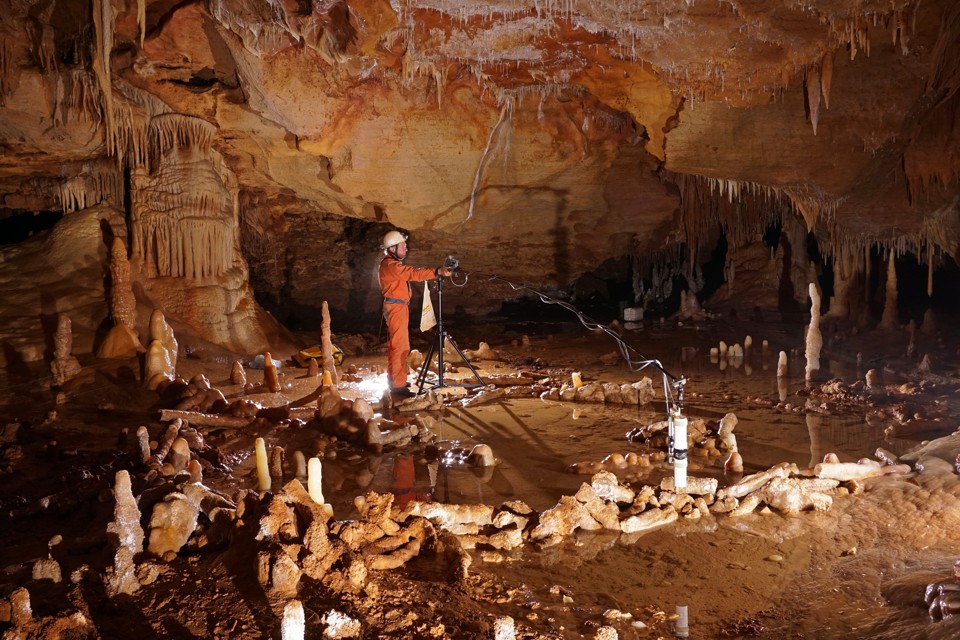The Ed's Up #139
I CONTAIN MULTITUDES is 75 days away from publication in the US, 98 days away from publication in the UK, and available to pre-order right now.

A Shocking Find In a Neanderthal Cave In France
Some 336 meters into the cave, the caver stumbled across something extraordinary—a vast chamber where several stalagmites had been deliberately broken. Most of the 400 pieces had been arranged into two rings—a large one between 4 and 7 metres across, and a smaller one just 2 metres wide. Others had been propped up against these donuts. Yet others had been stacked into four piles. Traces of fire were everywhere, and there was a mass of burnt bones. These weren’t natural formations, and they weren’t the work of bears. They were built by people. Neanderthals. 176,500 years ago. (Image: Etienne Fabre)

This Fly's Sperm Is One Thousand Times Longer Than Human Sperm
"In 1995, Pitnick realized that males of the tiny fruit fly Drosophila bifurca produce gargantuan sperm cells that are 6 centimeters or 2.4 inches long. That’s 20 times longer than the fly itself, and a thousand times longer than the average human sperm. If a man produced sperm that big, it would stretch diagonally across a basketball court.The megasperm seemed to contradict what we knew about how evolution governs the reproductive traits of animals. Sperm are meant to be small cells that male animals can produce in large numbers with little effort. They should be tiny, disposable, and numerous. So why did these particular flies evolve sperm that break all the rules." (Image: Romano Dallai)
Release the Kraken
"To her surprise, she didn’t find evidence of either cycles or declines. Instead, she found that since the 1960s, cephalopods numbers have been increasing. There had been anecdotal murmurs about such an upward trend before, but Doubleday’s data threw it into stark relief. The rise was obvious when the team analyzed data from both fisheries and other sources. It was there in both northern and southern hemispheres. It applied to species that stick to the same patch of ocean ocean floor, those that swim in the water layer just above the bottom, and those that patrol large stretches of open ocean. And it applied to every major group of cephalopod: For the most part, cuttlefish are doing well, squid are on the up, and octopuses are ascendant." (Image: Scott Portelli) 
Using CRISPR to Learn How a Body Builds Itself
"Sulston worked alone, in silence, hunched over a microscope for eight hours a day. By studying and drawing worms of various ages, he figured out the ancestor and descendants of each of their cells. It was a monumental piece of science. Sulston mapped the complete history of an individual, the comprehensive family tree of a single body. “We had the entire story of the worm’s cells from fertilized egg to adult,” he later said, upon accepting the Nobel Prize for his work." (Image: Vanhollebeke et al.)

Meerkats Mysteriously Know to Outgrow Rivals
"But their societies are also marked by competition and inequality. In any colony, almost all the sex takes place between one pair of dominant individuals. Their rank, as well as that of all their subordinates, is determined by their age and weight. Females either wait for the dominant matriarch to die or try to displace her, whereupon the next oldest and heaviest individual takes her spot. Males try to displace the heads of other groups, but the result is the same: The biggest challenger takes over from the deposed." (Image: Elise Huchard) More good reads
- This unlucky town keeps getting hit by violent tornadoes. Why? A quintessential Maggie Koerth-Baker piece: fascinating, crisp, funny.
- Great story on contradictory attitudes to Asian elephants & their handlers, by Hilary Cadigan
- A beautifully written ode to the implausible giraffe, by Anthony Lydgate
- "It was a pigeon. It was missing for five years. Suddenly it was back. Why? And where were the 10,000s of pigeons that vanished with him?" An amazing story by Robert Krulwich.
- Sickles across the neck, and other tricks for preventing the undead from rising. By James Close
- Polio-free world? Not if scientists refuse to destroy their research specimens. By Helen Branswell.
- Billionaire Peter Thiel bankrolled Hulk Hogan’s lawsuit against Gawker, which should really scare us. See also Wired’s perfect response and Ian Bogost’s piece with its perfect art.
- The Inevitable, Intergalactic Awkwardness of Time Capsules. By Cara Giaimo
- The ex-anarchist construction worker who became a world-renowned scientist. Great story by Daniel Gumbiner.
You can also follow me on Twitter or find my writing at The Atlantic or on my blog. If someone has forwarded this email to you, you can sign up yourself.
And that's it! Thanks for reading.
-Ed